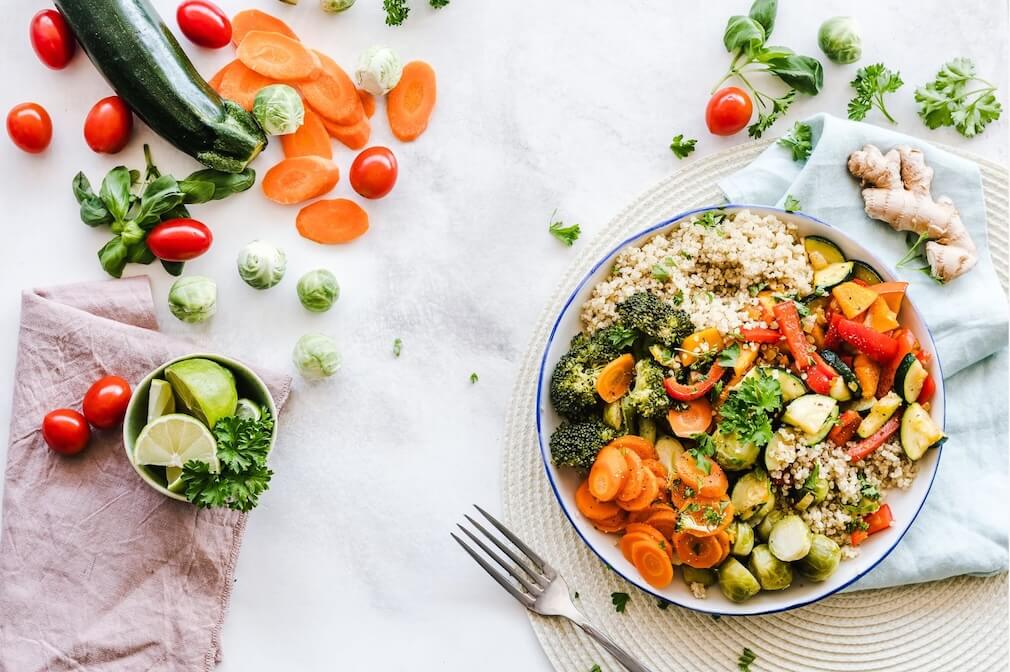Do I Have to Eat 100% Plant-Based?

Maybe you’re thinking about eating more plant-based, but you’re wondering: do I have to go fully vegan? You’ve heard that a plant-based diet is healthy—but does that mean cutting out all animal products? And what if you still want to enjoy something animal-based every now and then?
Many people think it’s all or nothing: either you eat 100% plant-based, or you’re not doing it “right.” That mindset can be overwhelming—or even paralyzing. What if you slip up or eat something animal-based—does it all stop mattering?
We’re here to reassure you. You don’t have to eat 100% vegan to enjoy the health benefits of a plant-based lifestyle. It’s not about being perfect—it’s about consistently moving in the right direction. And that’s exactly where Plants for Health can support you.
The Health Benefits
A mostly plant-based diet—rich in vegetables, fruits, whole grains, legumes, and nuts—offers a wide range of health benefits. It’s associated with a lower risk of premature death and many chronic conditions, including heart disease, autoimmune disorders, and type 2 diabetes. People who eat more plant-based also tend to have a healthier weight, better blood sugar and cholesterol levels, and more energy (1, 2).
Research suggests these benefits begin to appear when at least 80-90% of your diet comes from unprocessed, plant-based foods. But the more you shift, the more likely you’ll notice the effects.
We saw this firsthand in our own Plants for Joints research, where people with rheumatoid arthritis and osteoarthritis followed our lifestyle program. The more they changed their habits, the greater the health improvements. But here’s the key takeaway: even the group that made smaller changes still saw results. Every step matters—you don’t need a “perfect” diet to experience benefits.
Every Step Counts
So no—you don’t need to be a “perfect vegan” to feel the impact. Every step counts. Did you know that every extra portion of fiber brings measurable health benefits? Just 10 extra grams of fiber per day can reduce your risk of:
- Death by 11%
- Cardiovascular disease by 17%
- Cancer by 9% (3)
Pretty incredible, right? No supplement can match that! You can hit those 10 grams with just:
- 150 grams of black beans
- 90 grams of uncooked oats
- 2 bowls of raspberries
And it’s not just fiber. Research also shows that replacing just 3% of animal protein with plant protein can significantly lower your risk of heart disease and several types of cancer (4). Similarly, replacing 50 grams of processed meat with 28–50 grams of nuts, legumes, or whole grains lowers your disease risk (5).
The Perfectionism Trap
As you can see, you don’t need to eat 100% plant-based to see real benefits. At Plants for Health, we don’t believe in all-or-nothing. In fact, perfectionism can work against you. When you place strict rules on yourself, every “slip” feels like failure—making it harder to stay consistent. What does work? Taking small, realistic steps that fit into your lifestyle:
- Swapping your yogurt for unsweetened, fortified soy yogurt? That’s a success.
- Replacing meat at dinner with a plant-based alternative? That’s a success.
- Choosing a handful of unsalted nuts over a bowl of chips? Also a success.
Small wins give you a sense of progress and help you stay motivated. It’s not about doing everything perfectly—it’s about building habits you can and want to maintain.
And, yes, it’s absolutely possible: enjoying nourishing, colorful meals without stressing about perfection. By eating mostly plant-based, you’ll feel energized, fuel your body with what it needs, and have the freedom to make choices that work for your lifestyle. No strict diets. No guilt. Just a sustainable way of eating that feels right.
At Plants for Health, we help you take it step by step—so plant-based eating becomes something that works for you. Because healthy eating isn’t about being perfect. It’s about being consistent.
Every step toward more plant-based matters. Small changes, big impact—start today: explore the program.
Sources
1. Wang, Y., Liu, B., Han, H., Hu, Y., Zhu, L., Rimm, E. B., Hu, F. B., & Sun, Q. (2023). Associations between plant-based dietary patterns and risks of type 2 diabetes, cardiovascular disease, cancer, and mortality – a systematic review and meta-analysis. Nutrition journal, 22(1), 46.
2. Walrabenstein, W., Wagenaar, C. A., van der Leeden, M., Turkstra, F., Twisk, J. W. R., Boers, M., van Middendorp, H., Weijs, P. J. M., & van Schaardenburg, D. (2023). A multidisciplinary lifestyle program for rheumatoid arthritis: the ‘Plants for Joints’ randomized controlled trial. Rheumatology (Oxford, England), 62(8), 2683–2691.
3. Liu, L., Wang, S., & Liu, J. (2015). Fiber consumption and all-cause, cardiovascular, and cancer mortalities: a systematic review and meta-analysis of cohort studies. Molecular nutrition & food research, 59(1), 139–146.
4. Zheng, J., Zhu, T., Yang, G., Zhao, L., Li, F., Park, Y. M., Tabung, F. K., Steck, S. E., Li, X., & Wang, H. (2022). The Isocaloric Substitution of Plant-Based and Animal-Based Protein in Relation to Aging-Related Health Outcomes: A Systematic Review. Nutrients, 14(2), 272.
5. Neuenschwander, M., Stadelmaier, J., Eble, J., Grummich, K., Szczerba, E., Kiesswetter, E., Schlesinger, S., & Schwingshackl, L. (2023). Substitution of animal-based with plant-based foods on cardiometabolic health and all-cause mortality: a systematic review and meta-analysis of prospective studies. BMC medicine, 21(1), 404.